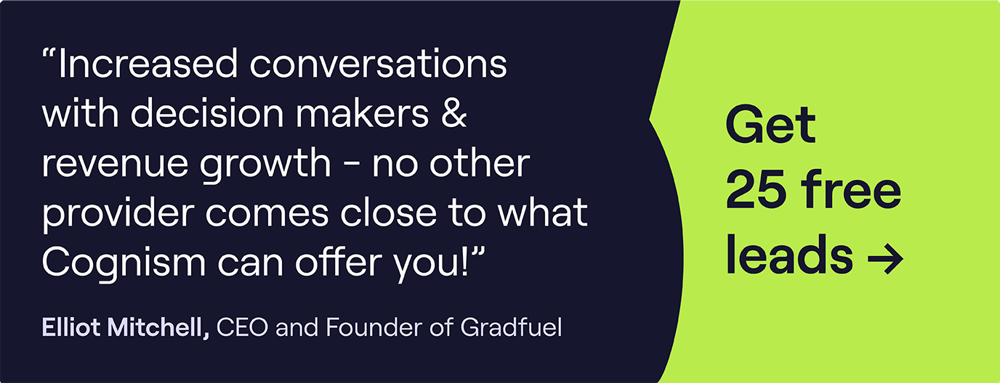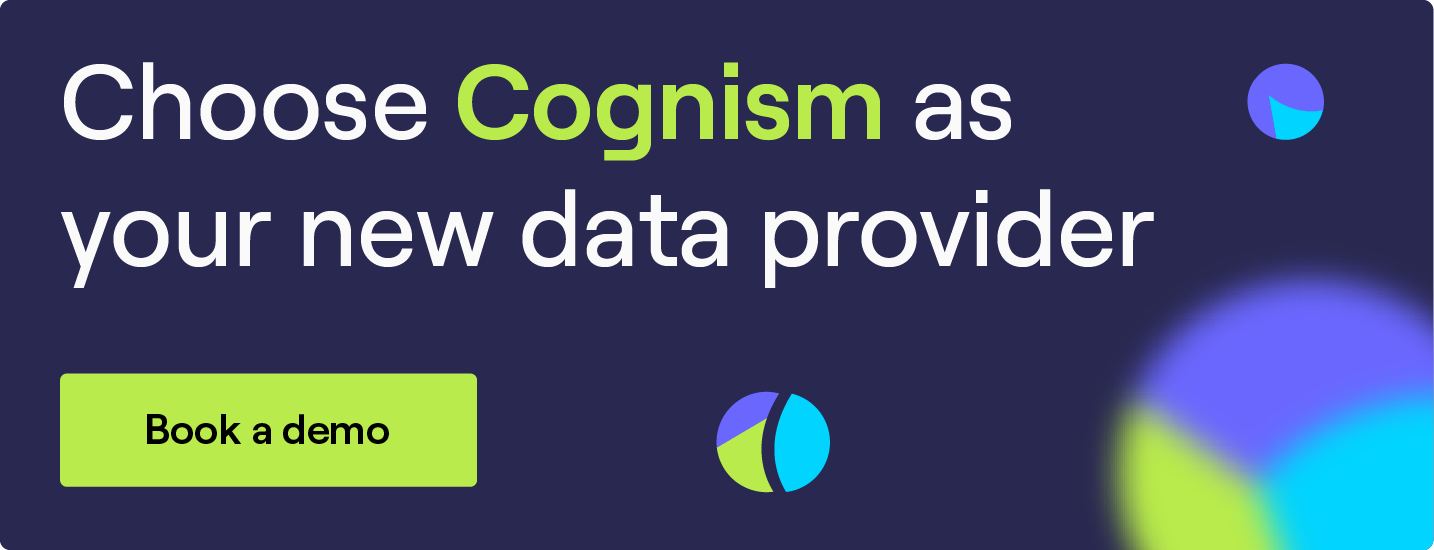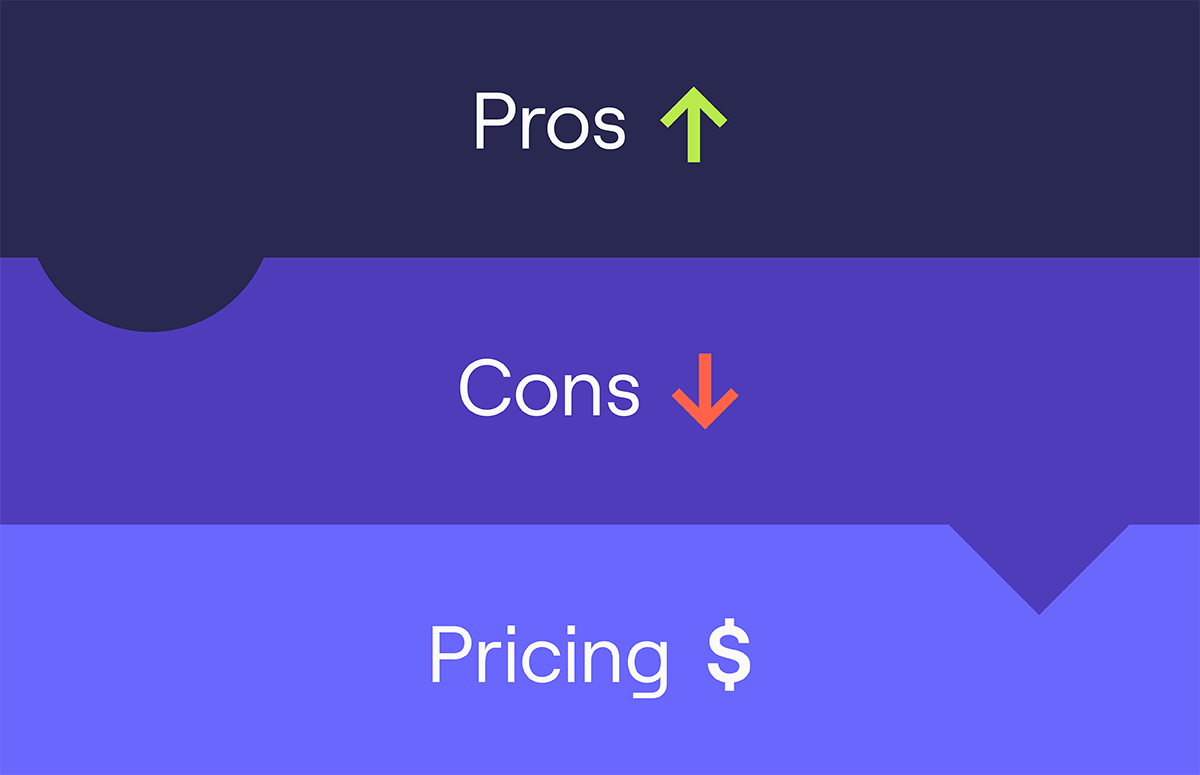What is Real Time Data and How Can Sales Use It to Boost Revenue?
Imagine closing prospects the moment they’re ready to buy. With real-time data, now you can!
It gives you a heads-up on key changes, such as M&As, job moves, or team growth. Your team stays ahead — ready to reach out and start selling, fast.
So what is real time data, how does it work, and how can you implement it without a complex data infrastructure? In this article, we’re exploring all this and the benefits of using accurate B2B data for real time sales.
Let’s get started 👇
What is real time data?
Real time data refers to immediate and continuous access to information about sales activities, customer interactions, and market trends.
Sounds complex, right?
Here’s what it means for your sales and marketing teams:
With up-to-date insights, you can make smarter decisions, personalise your outreach, and build stronger relationships.
That’s because sales data gives your teams timely insights into their performance, allowing them to react quickly to changing market conditions, identify opportunities, and address challenges.
Imagine your target account has another funding round or a significant market player acquires it. While previously, they wouldn’t have had the resources to buy your product, now might be the right time to approach them.
Just think of how much more effective your outreach emails could be if you started targeting people recently promoted to a decision-maker role who are in the market for your solution.
With an AI-powered B2B data provider like Cognism, you can! Here’s how to use this powerful tool to find and target high-intent accounts.
%20Hub/Resource%20cards/gtm-plays-cheat-codes-high-intent-customers.webp)
Job role: SDR
Improve close rates with intent signals
Use this play to:
Why real time data is important
Real time data is important because it offers numerous benefits for B2B businesses.
What does it have to offer for your vertical? Let’s look at some tangible benefits real time data can provide for your company:
1. Timely sales opportunities
By accessing up-to-the-minute information on customer behaviours, preferences, and buying patterns, your B2B sales team can engage with prospects immediately, increasing the chances of closing deals.
Receiving funding, getting promoted, and increasing team size are real time insights that can trigger your sales activities — emails, LinkedIn messages, or call invitations.
2. Dynamic pricing and offers
Sales insights from immediate data updates allow businesses to adjust pricing based on market fluctuations or competitive moves.
Teams rarely have time to research these aspects. As a result, they can discover competitors offering better products or pricing during their sales conversations with buyers.
With the help of real time data collection, you can keep track of competitor pricing, customer demand, and inventory levels to optimise pricing strategies and make instant adjustments. All this with little-to-no work for your sales team.
Tip! Don't forget to incorporate robust key management for data security to safeguard all of your sensitive information and avoid additional risks
3. Immediate lead engagement
When a prospect expresses interest or takes specific actions, such as visiting a website or filling out a form, you can immediately engage with them, increasing the likelihood of converting them into customers.
All you need to do is define your sales triggers and actions.
For example, after a prospect visits your pricing page, you can email them to schedule a demo.
Henderson Scott used Cognism’s B2B data and sales trigger alerts to accelerate sales efficiency. They said:
“Within Cognism, you can see if a company is hiring, has been recently acquired or has received a round of investment.”
“Additionally, filtering company size in the platform is great for understanding how business hierarchies are laid out. These are all fantastic buying signals for us.”
Furthermore, with real time data processing, you no longer rely on manual tracking and outreach. It can all be automated to nurture prospects faster.
4. Accurate sales forecasting
You can gain real time actionable insights into sales performance and, as a result, get accurate sales forecasting.
Sales managers can monitor sales data quality in actual time, track progress against targets, adjust sales strategies to meet revenue goals and effectively manage pipeline visibility.
This enables more precise financial projections, and you can further enhance this process by implementing financial modeling software that integrates sales data with financial metrics.
You can also use a tool like Airtable to centralise and organise sales data. This makes it easier to collaborate, analyse, and create dynamic reports for better decision-making and strategic planning.
5. Personalised customer interactions
Instant data offers you the opportunity to personalise customer interactions more effectively.
By accessing real time data analytics on customer preferences, purchase history, and previous interactions, you can tailor-make relevant recommendations and provide a personalised customer experience.
6. Instant sales performance insights
With real time data analysis, you gain instant visibility into sales performance metrics.
In actual time, sales representatives can monitor their performance, such as call activity, conversion rates, and revenue generated. This immediate feedback enables reps to course-correct, improve their sales techniques, and achieve better results.
What’s more, effective reporting solutions make it even easier to track these metrics and spot areas for improvement.
7. Agile sales strategies
By monitoring real time market trends, competitor activities, and customer feedback, sales managers can make data-driven decisions, adjust sales strategies, and seize emerging opportunities.
8. Prompt customer issue resolution
Business intelligence tools that offer real time data services help sales teams promptly address customer issues or concerns.
By tracking customer behaviour, such as feedback, complaints and inquiries in actual time, sales reps can proactively contact customers and help eliminate them.
📞 Book a call with a Cognism data expert to learn more about our compliant data.
How does real time data work?
Real time data means fetching specific actions on the go.
For example, these actions can be anything your customers do on your website or offsite such as visiting your sales pages, checking your company’s profile on LinkedIn, or visiting sites similar to yours.
Before the system stores any information, events are collected. As a result, it makes it possible for sales data to be managed instantly and for predictive analytics to occur.
But don’t worry; you don’t have to be a data analyst or scientist to make real time B2B data work for your team.
Here’s how marketing and sales teams can use real time data for success.
How can marketing and sales use real time data?
Updating your lead records in actual time results in better sales performance and cost savings across your entire business.
Using it helps your sales team unleash specific triggers to initiate conversations instead of running mass campaigns with a low response rate.
There are many ways to use real time big data for better business decisions. Here’s how:
- New company funding — you can learn about the funding a company receives right after the information becomes public. You would typically source this information using a real time data platform like Crunchbase or Cognism. As a result, you can save valuable time and reach out to B2B decision-makers right away.
- Enterprise acquisitions — business acquisitions are a strong growth signal as companies going through the process look for tools and partners who can assist them with the transition. It’s your chance to get their attention before your competitors become aware of the business activity.
- Visiting critical webpages — prospects checking out your pricing or product pages can signal high purchase intent and the sales opportunity you shouldn’t waste. Instead of learning about the lead’s activity days or months after they visit these pages, you can track them immediately using intent data from a real time customer data platform like Cognism. This data type can also help trigger a sales action like an email sequence or sales call.
- Improved lead scoring — using real time data helps improve lead scoring accuracy. Once your prospect performs a critical action on your website or some event triggers an increase in their score, sales reps can react fast and reach leads with a high chance of a conversion.
Examples of real time data types
Now you know what real time data is, how it works, and its benefits. But what specific examples can be helpful for sales and marketing teams?
Let’s explore its benefits for B2B sales and marketing strategies.
1. Intent data
Real time intent data helps identify potential customers who are in-market for your solutions — if they’re actively researching or showing interest in products like yours.
You can gather intent data from various sources, such as website tracking, social media monitoring, and content consumption patterns.
Ultima used real time data solution, Cognism, to access intent data and direct dials. As a result, they generated ROI in 8 weeks. Here’s what they said about the tool:
“I use a metric called TTE (Time to Engagement). It’s important as a business that we can provide tooling to salespeople from the point of identification to conversation. Cognism identifies the leads, allows us to target them based on the prospect’s intent and then follow-up with the sales action. Using intent data has massively reduced our TTE.”
“The sales managers used to make 100-150 calls per day. Now they can achieve their targets by making 30 calls daily because they are calling prospects who actually pick up the phone. That’s more results, fewer calls.”
2. Email verification
Instant email verification services help ensure the accuracy and deliverability of email addresses in your contact database.
By instantly verifying email addresses, you can maintain a clean and updated prospecting list, reduce bounce rates, and improve email marketing campaign performance.
Just think about the lost opportunities resulting from poorly researched email addresses that have bounced or need to be updated. With real time email verification, you can eliminate the risk of sending emails that don’t get replies.
3. Phone-verified numbers
Phone number verification in actual time allows you to validate and verify phone numbers in your database. So instead of calling the wrong person and wasting your sales reps’ time, you can provide your sales team with up-to-date phone numbers.
For example, when sourcing phone numbers, Cognism checks them against Do-Not-Call lists from different countries. As a result, you don’t run into trouble with privacy regulations.
Cognism can also source verified phone lists for you that are up-to-date and mistake-free so that you can contact your target accounts fast.
4. Social media monitoring
With real time customer experience tracking across social networks, you can dip into customer sentiments, brand mentions, and industry trends.
By analysing this data, you can identify opportunities for engagement, respond promptly to customer queries or concerns, and leverage social listening to inform your marketing.
As people often use social media to share their negative experiences about a brand, you should respond fast and resolve the issue before the next PR crisis unfolds.
5. Website Analytics
Website analytics tools track and analyse customer behaviour on your website, including page views, click-through rates, conversion rates, and other engagement metrics.
This data helps you understand user preferences, optimise your website’s performance, and improve the customer journey.
How do you get real time data?
A wide range of B2B real time selling tools are available to streamline your business processes.
With Cognism, you can source up-to-date client data such as demographics, firmographics, and intent data and enrich your existing database. This is all powered by its innovative Enrich or DaaS solutions.
It supplies your sales team with new data and real-time insights that help personalise lead outreach at a time when customers are most likely to buy.
Cognism’s DaaS offers flexible delivery options to integrate B2B data in the format and frequency of your choice:
- API & Flat File delivery: Real-time enrichment or scheduled batch drops via Snowflake, S3, Google Cloud, Databricks or SFTP
- Data quality & compliance: Audit-ready metadata and consent trail are aligned with GDPR, CCPA, and PECR.
- Continuous value realisation: ROI benchmarking, usage health reviews and expansion scoping.
.webp?width=600&height=339&name=Data-as-a-service%20imagery-01%20(2).webp)
What’s more, with Cognism’s Diamond Data®, you get accurate, phone-validated mobile numbers and unrestricted access to person and company-level data*.
*Subject to fair usage policy
Real time data FAQs
What is real time data analysis?
Real time data analysis is the process of analysing data as it is generated or received, with minimal delay between data capture and insights extraction. Real time analysis consists of collecting, processing, and interpreting data in actual time to gain immediate insights.
What is real time data integration?
Real time data integration refers to combining and synchronising data from multiple sources in actual time or near real time.
It involves collecting, transforming, and consolidating data from various systems, applications, databases, or streams and making that integrated data available for immediate use.
What is real time data streaming?
Real time data streaming refers to the continuous and immediate data transmission from a source to a target system or application. As it’s generated, the processing and analysis of data is enabled.
It involves the uninterrupted flow of data in a stream-like fashion, allowing for near real time or real time analysis, processing, and data consumption.
Better data means better sales and marketing
Don’t wait too long to invest in a quality real time data tool!
With Cognism, you can enrich your current database and update your CRM records with crucial account information.
With accurate, up-to-date data, you can react fast and reach out to prospects with personalised messaging based on intent, firmographic, demographic data, and signal data tailored to your markets.
Book a demo with Cognism today 👇




